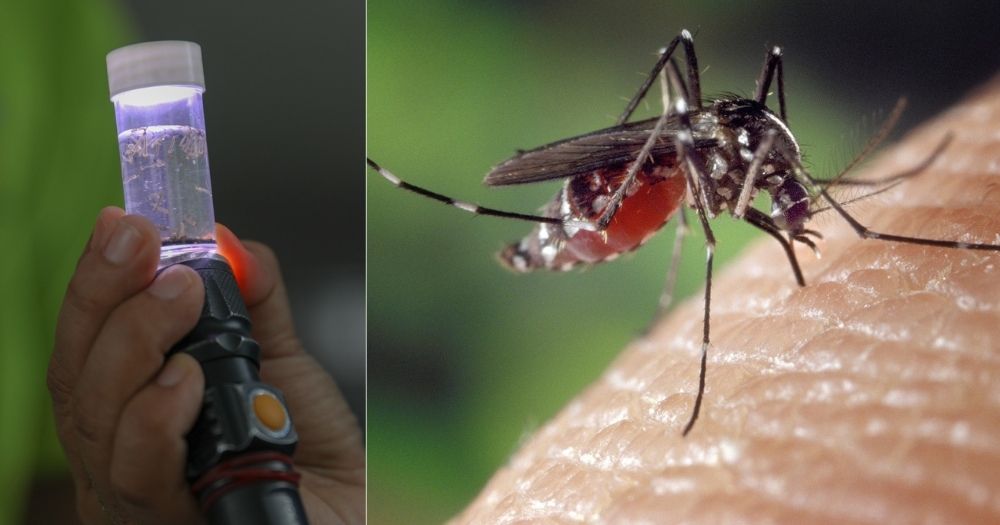Follow us on Telegram for the latest updates: https://t.me/mothershipsg
In a media release on Jun. 1, 2021, Singapore's National Environment Agency (NEA) said that it expects an increase in the number of dengue cases.
Increase in dengue cases
NEA's expected increase in dengue cases can be attributed to the following three reasons:
1) Increasing Aedes mosquito population
Drier and warmer weather conditions are expected over Singapore for the coming months, according to the Meteorological Service Singapore (MSS).
This speeds up the breeding cycle of Aedes Aaegypti mosquitoes; striped mosquitoes that are responsible for the transmission of dengue.
The population of Aedes mosquitoes has been increasing in Singapore, said NEA.
When compared to Jan. 2021, the Aedes mosquito population increased by about 30 per cent in Apr. 2021.
NEA reported a high population of Aedes mosquitoes in areas including Hougang Avenues 6, 8 and 10 and Jurong East Avenue 1 and Street 32.
Furthermore, warmer weather shortens the time needed for biting Aedes mosquitoes to mature.
This means a shorter time between a mosquito picking up a disease and, subsequently passing it on, according to CNA.
All these add up to a potential increase in dengue risks in Singapore.
2) Lower herd immunity
The dengue virus has four known strains and all four cause the same disease and range of symptoms.
While dengue is endemic to Southeast Asian countries, the dengue virus strain 3 (DENV-3) has not been dominant for the past 30 years, said NEA.
Past incidences of dengue virus strains 4 (DENV-4) have been consistently low.
Since Feb. 2021, however, NEA noted that the less common DENV-3 and DENV-4 made up more than half of the dengue strains sampled.
DENV-3 was detected in Cashew Terrace while DENV-4 was detected in Hougang Central and Pasir Ris Street 21.
This led to NEA's conclusion that the local population immunity for DENV-3 and DENV-4 is low, resulting in more people being susceptible to dengue transmissions.
3) Staying home and working from home
During the 2020 Circuit Breaker, when Singapore residents were advised to stay at home, a study by NEA and Saw Swee Hock School of Public Health, National University of Singapore (NUS) found almost 50 per cent more infections.
Most of the infections were adults between the working ages of 20 to 64 years old.
In the same vein, more people are staying in and working from home due to the Phase 2 (Heightened Alert) measures.
NEA said that this could increase biting opportunities for the "day-biting" Aedes mosquito, potentially increasing the risk of dengue transmission.
Preventive measures
Members of the public can protect themselves against dengue by spraying insecticide in dark corners around the house, applying insect repellent regularly and wearing long-sleeve tops and long pants, said NEA.
NEA also urged all members of the public to remove stagnant water and prevent mosquito breeding at least once a week.
 Photo from NEA's website.
Photo from NEA's website.
Comprehensive mosquito control measures and good housekeeping should also be in place.
NEA will continue to conduct targeted inspections at areas with higher mosquito population and has stepped-up operations at dengue clusters.
First-time offenders will be penalised with a S$200 fine for a single instance of mosquito breeding. A S$300 fine will be imposed should multiple mosquito breeding habitats be found during the same inspection.
Penalties will increase for subsequent offences.
Under the Control of Vectors and Pesticides Act (CVPA), a fine of S$5,000 or an imprisonment term for up to three months or both will be imposed for third and subsequent offences.
Related stories:
Top image from Pixabay and NEA Stop Dengue Now/FB
If you like what you read, follow us on Facebook, Instagram, Twitter and Telegram to get the latest updates.

